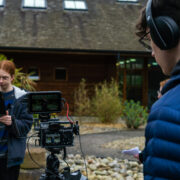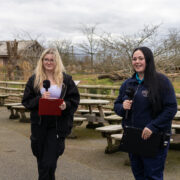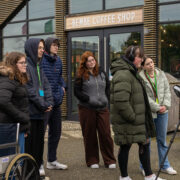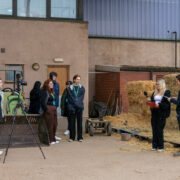Galvanising the power of young people and equipping them with the skills, attitudes, motivation, tools and opportunities needed to help them play an active role in tackling the nature crisis we’re all facing is a vital part of the work we do at the zoo. That’s why we’re constantly innovating and developing new ways to engage young audiences and make sure their voices are heard.
Not all young people are interested in the same things, so it’s important to find new, different and exciting ways to get as many as possible involved with conservation, whatever their background or interests. One method is using technology and our expert educators have been working with young people to test different ways of using multimedia in our programmes.
Earlier in 2023, a group of seven multimedia students joined us from Cheshire College to take part in a pilot project to create a podcast about conservation and the role of zoos. The seven-week programme saw the students get introduced to the zoo, meet zoo experts and learn skills to produce a podcast in a professional studio space in Chester.
One of our Conservation Masterplan targets is to empower 10 million people to live more sustainably for the benefit of wildlife by 2031. This project was designed for the group to go on that empowerment journey with us, both to feel more empowered themselves, but also to learn the skills to empower others through their podcast episodes.
The journey the students went on was amazing with all of them commenting on how much more confident they felt to talk about conservation and the work that Chester Zoo does through taking part in the podcast project.
When asked, one participant stated:
“I do [feel more empowered]. I feel I can spread the message Chester Zoo stands for and am motivated to talk via the podcast. I feel conservation is crucial to preventing extinction.”
The podcast itself is designed to be a product made by young people, for young people. Another factor that was really valued by the students was they could take ownership of the narrative, the discussions and the information that they felt was most important to give to other young people.
We know through our research that young people feel valued when included in decision making, so taking an approach using co-production was really important, not just for this project but for all of our other programmes with young people too.
This initiative is just one of the ways we work with young people. It’s important to us to provide creative ways into conservation, understanding that not everyone is passionate about the same things, so providing choice and alternative pathways into conservation is crucial.
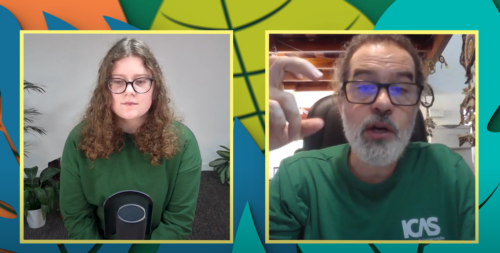
We’re firm believers that anyone can be a conservationist – through whatever career path they take or just in their daily lives. In one of the upcoming podcast episodes of the series, Libby, one of the students involved, had the opportunity to interview one of our partners in Brazil, Arnaud who said:
‘Many people believe that to be involved in conservation that you need degrees in biology, veterinarian degrees…and that is far from the truth. What you are doing right now is conservation. Giving us a voice is conservation. So, if you’re a communicator helping to communicate, that’s doing conservation. Basically conservation is a very multidisciplinary science, so whatever you are interested in can be applied to conservation and that’s why it’s so important to do something that you enjoy, something that you are good at, because that’s how you become a good professional to actually do something that you love. So if you do something that you love and apply it to conservation, then you’ll be a fantastic conservationist. Young people are our future and conservation is all about the future”
One of the main objectives for running the pilot podcast programme can be summed up by one of the podcast hosts, Eddie:
“Before joining the podcast, I genuinely didn’t know what conservation actually was, so I feel like it’s important to talk about those things to other people so that then that information can be spread and an every day person can have an impact.”
Through using creative methods such as podcasting, filmmaking and games making, we can start to reach more young people through our programmes. And with a new studio at the zoo as part of our Conservation Education Hub, we’re planning to integrate many more creative and multimedia interventions into our programmes for young people.
Youth Zoocast
The whole podcast made by young people is now available…
